OFF-TOPIC (3)
By:
March 21, 2019
Off-Topic brings you over-the-transom, on-tangent essays, dialogues and subjective scholarship on an occasional, impulsive basis. This month, a conversation and hallowed geek-out with fringe chanteuse and downtown divinity Raquel Cion on her incarnation as the last great Bowie character, that only she could create.
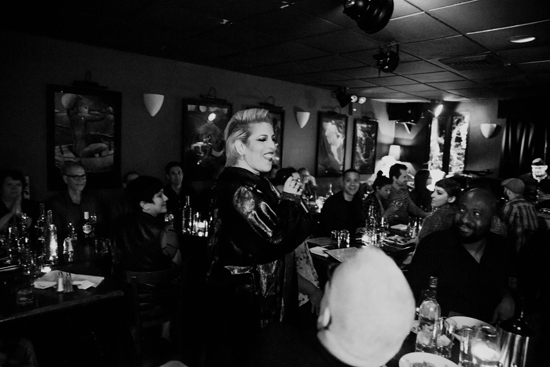
The highest purpose of history is not to repeat what happened, but to tell us what nobody knew until now. Raquel Cion pulls in the nets of what David Bowie’s music said and meant in ways that reveal something new to us in its meshes each time. Bowie had the power to rearrange the relative weight of previous identities in the story of his life, realign public conception of him and his possibilities, and thereby change the past. In Cion’s interpretation of his canon, an eyewitness journey alongside his cultural impact and its significance for one suburbs-bred misfit in the making, different timelines of Bowie’s own work move to the foreground as their context in the culture and in Cion’s life shifts. I first saw her cabaret memoir, “Me & Mr. Jones: My Intimate Relationship with David Bowie,” shortly after Bowie had died, making it already a profoundly changed document from the one I’d been hearing about just weeks before. Homage became memorial, and by the end of that year the show was metamorphosing into a score for survival, a journal of Cion’s fight for her own life when she too was diagnosed with cancer, in a dialogue with the music that had in many ways given her her fullest life to begin with. Facing that music once again, she gave an emotional performance on what would have been Bowie’s birthday this year (Jan. 8, 2019), and we spoke on the third anniversary of his death — two days later. Now healthy again and left to tell many more tales, Cion and I shared a few moments of the future…
HILOBROW: How are you on this of all days?
CION: I’ve been avoiding Facebook and all the other social medias, because everyone has something to say, and I am often compelled to say something back, so I’ve been stepping away, and just being very kind of quiet… and knitting, and cooking…
HILOBROW: I hope the knitting involves sequins of some sort!
CION: Of course.
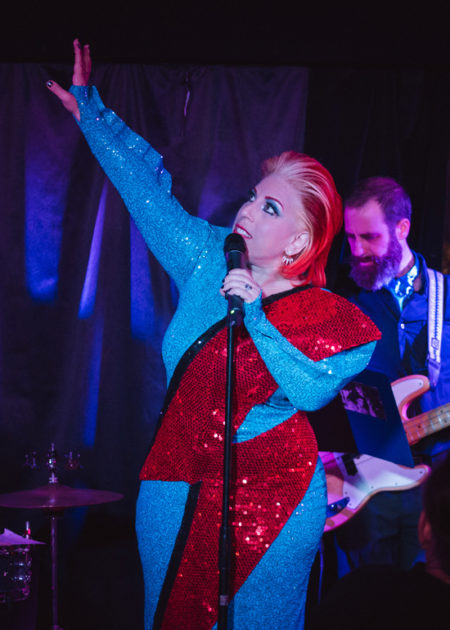
HILOBROW: Three years into doing the show on your own, so to speak, how has your conception of “living with” this music changed, now that you’re carrying on beyond the point where there will be no more of this music?
CION: Well, I’m sure there are some secrets, some things that we don’t know about. [But] I’m always amazed how I never tire of listening to Bowie, or seeing him, seeing versions, images of him. So I feel like there’s so much to revisit, and there’s so many ways to look back, and listen to things in new ways. There’s always something to discover. And maybe I’m in denial that there won’t be new music [laughs] —
HILOBROW: I meant newly produced, I’m sure there’s a lot of stuff squirreled away!
CION: Yeah, he planned things out for quite some time.
HILOBROW: I never saw your show until after he was gone, but did you used to have that motif of “raging” before he died, or before [the track from the Lazarus musical] “Killing a Little Time” was in existence? Because that word, “rage,” is so central to that song…
CION: I use that word with addicts, because that’s how I defined that behavior when I was living with someone who had that behavior — and hey, there’s [even] a Tin Machine reference right there; [sings: “Ragin’, ragin’, ragin’, burnin’ in my room!”] — yes, that was there before. “Killing a Little Time” really came with the cancer stuff. Because I feel like there’s no way that song is not about cancer, that’s what it seems like to me. Maybe I’m being presumptive, but it feels that way; it just speaks very much to that experience which I, sadly, have experienced.

HILOBROW: When I was hearing you sing it the other night, it occurred to me for the first time that it’s almost as if “Killing a Little Time” is “It’s No Game Pt. 1” to “Dollar Days”’s “It’s No Game Pt. 2” — they each reference his mortality, and one is accepting, and one is so not accepting.
CION: And I love it when he swears, when he says “fuck,” because — he knows how to tell a story, he knows how to use those words, use the emphasis, use a certain accent or a lightness or a harshness, so when he says “to fuck you over” it’s like, who-oah… or in “Girl Loves Me” when he says “where the fuck did Monday go,” it’s like, the depth of it…
HILOBROW: He saves it up until it really means something.
CION: It’s choice, it’s not just every other word [laughs].
HILOBROW: Now that you mention it, it’s kind of like the lyrical equivalent of what people much more schooled in musical construction than I am bring up, in terms of his compositions never going where you expect. And of course the word I was asking about is the title of one of his most rumored tracks…
CION: Wait, which one?
HILOBROW: “Rage,” supposedly from the very end [and here I am completely misremembering the much-alleged, finished but unreleased “final” song “Blaze”]. Maybe [it’s] among the five extra demos Tony Visconti claimed Bowie had sent him after Blackstar. Which, if they’re as fully realized as the one of “’Tis Pity She Was a Whore” that came out before the album, might as well be released.
CION: Which I recently listened to, I hadn’t in a while. And, I frickin’ love it — there’s a mania in that demo that is so interesting; I feel like he’s really playing with… it feels manic, though obviously I feel like, as a performer, he is in complete control of that — it’s not like the mania of when he lists the days of the week in a 20-minute drum solo in “Jean Genie” [laughter] or that crazy accent he’s speaking in through most of the Cracked Actor bootleg.
HILOBROW: The strange thing about “’Tis Pity” is that it’s manic and methodical.
CION: And as my voice teacher would say, it’s his “true-setto”; he’s really living in that fragile and wonderful falsetto of his.
HILOBROW: The back of the 12-inch said “recorded at home,” and I was thinking what kind of home exactly?? [laughter] Anyway, how do your foresee proceeding with the coherence of the show and the possible new roles or priorities or positions that certain songs might take in your life (or your instincts as a performer)? We’ve seen the one with “Killing,” but do you see just the interpretations evolving, or could you foresee actual setlists changing over time — or is that just for when you do different types or settings of shows?
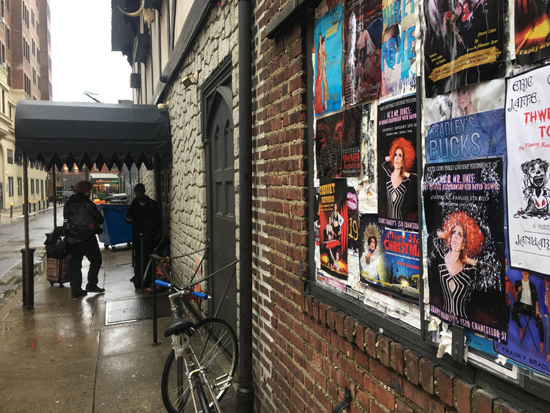
CION: I think it could change over time, the show is mutable — which speaks to Bowie and his canon! — but also speaks to this place he holds within my life, so whatever situation I find myself in personally, professionally, healthwise, socially, whatever position the world is in, I feel that there is something that speaks to those things. The songs within the show really are used to further the meta-narrative of [the life story] we’re telling. And sometimes it’s using the songs themselves to tell the story, so I don’t have to. So, it is changeable. But I also feel that we’re in a very sweet place with the show right now, even though I’m constantly whittling at the script. And we change it for different audiences, and if, for instance, there is a day that is special; we just did a show on his birthday. That took a lot of thinking on my part, like, how do you acknowledge that without it just being, “Ohmygodit’sDavidBowie’sbirthday!” — for years and years I would take the day off work [laughs] and just listen to Bowie or watch movies; it’s always been a day for me that’s dedicated to just immersing myself. Even though… most of my days are like that [laughs]. But it’s more mindful, maybe.
But also, I want to make it accessible to those people who may not be Bowie fans? And I think it is in that we all have something that we go to for comfort or something that brings us back to a place of joy or a place of love or a place of safety. Or a thing that just speaks to our soul, whatever it is.
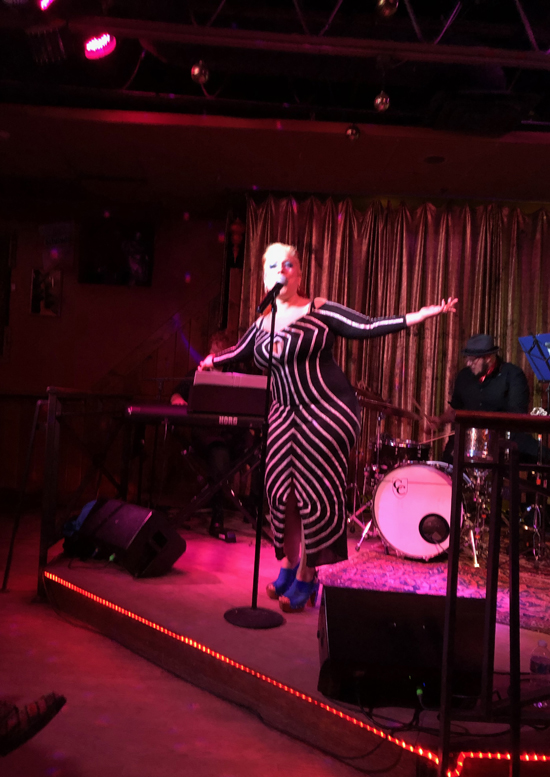
HILOBROW: One thing I got more of an insight into just from comments by some people who came up to you after the birthday show, is that… I think in many ways, doing a mostly lesser-known selection of his works actually helps people connect with it more, because they don’t come in with a prior conception that everything is probably being measured unfavorably against? It’s like, you had people who seemed to be somewhat younger than us saying, “Oh, I didn’t know a lot of those songs but now I like them,” whereas I myself will go into something like Lazarus and think, “Wow, I didn’t know that ‘”Heroes”’ could be silly”!
CION: Oh Jesus. [laughter] You know, he didn’t want it in.
HILOBROW: I know he gave [co-playwright Enda] Walsh carte blanche to pick the songs…
CION: Yes, but he said he didn’t want that one, and then they convinced him. Did you see at the [David Bowie is…] exhibit in Brooklyn, they had a script, a Lazarus draft. And I just read the first page of the draft, and it was so much more interesting than what [was staged]. It still kills me — [talking about Lazarus] is the hardest part of the show for me.
HILOBROW: The feeling that it falls short of, or maybe even contradicts his vision?
CION: There’s that, but it’s also just my own shit; that part is harder for me to talk about and feels more vulnerable in a way than talking about cancer and talking about death. There’s a professional shame around that. Because… even though I didn’t like the show! — I still wanted to be in the show [laughter]. It runs deep.
HILOBROW: Everyone is going to sympathize with a fight for survival, whereas any kind of self-disappointment about not being involved with one’s idol runs the risk of… put it this way, as I was walking away from [the birthday show] I was remembering this scene in the original movie of Fame [irony unintended :-)] where the acting teacher says to the Freddie Prinze kid, “easy, you want them laughing with you, not at you”; you so had people laughing and crying with you.
CION: I got into a little tiff with a very, very dear friend of mine, who said, “who are you to say that [Lazarus] wasn’t good work?” Seeing the work [in 2015] made me feel like something was wrong — even more wrong. I was like, “I don’t see his hand in this. I’m not seeing him enough in this.”
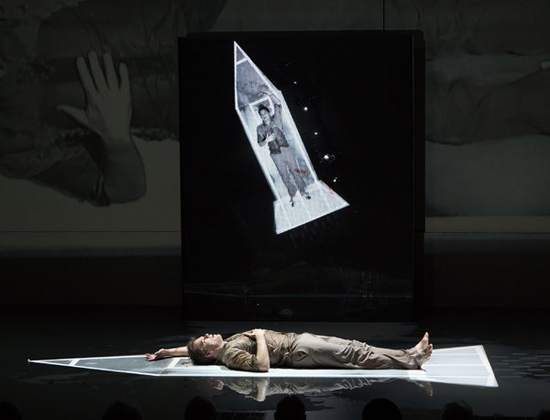
HILOBROW: That’s one reason I hope that script-draft is in the “David Bowie is” app, because the most fascinating part of the show when I saw it in Chicago was standing there for [laughs] half-hours on end and reading his notes; to see that map of his mind was the most fascinating thing for me.
CION: Same.
HILOBROW: I’d had the idea of going to the Brooklyn show and, if they would let me, entering at the end, so I would only see the parts that hadn’t been in Chicago, but I could never marshal the emotional energy to go see it, period, because of personal associations [Note: I saw it on a trip to Chicago that was my last with my late wife] — but if it’s in the app, I can enter that at any point!
Even though, his stuff changes so radically from page to demo to official recording that it’s hard to say… my own feeling is right down the middle between you and your friend: Lazarus is largely bad work, but I remain of the conviction that, to the day he died, he knew exactly what he was doing, and it had his complete [approval]. I mean, one has only to read the interviews in 1987 to know that he did exactly what he set out to do with Never Let Me Down, for instance, even though he then disclaimed that album for the rest of his life [laughs].
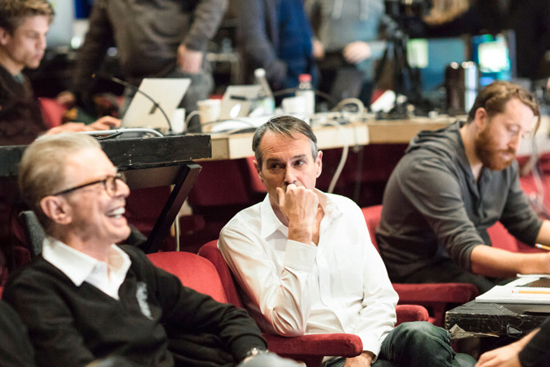
CION: My theory is that… obviously, he was ill, [and also] I think people were intimidated. Ivo van Hove has his actors show up off-book, and Bowie — even if he wrote the lyrics, or wrote the song, or brought in the demo — when he got in the room, he wrote; he changed things, he, y’know, “Oh, [let me] step outside for an hour, look, I wrote ‘”Heroes”’” [laughter]. So he was used to creating within the studio, in the process. So I think he did choose people — I mean, I love Ivo van Hove’s work, a lot of it, and I love Enda Walsh’s work — but I think they didn’t push back. And I think he chooses collaborators to push back. And challenge themselves, and challenge him. And that is everything on Blackstar, and on his EP from Lazarus. And it’s a joyous pushing back, I mean it’s that listening and that experimenting, and… there’s a joyous quality to it, there’s a moving beyond himself.
HILOBROW: The pushing back creates a friction, whereas I do get a sense from Lazarus not of combustion but of distance, of the twain not meeting. Of course, I guess it was Walsh who reported that Bowie said to him [after Lazarus was set up], “Now let’s start on the next one!” which I can believe, and is also what makes me believe that the end product of Lazarus was Bowie-certified. [But] that he considered it… not a rough draft, but, just the opening pass [at doing a musical]. Which doesn’t rule out the possibility that, had he lived, he would have morphed it greatly after the fact.
CION: Oh, totally.
HILOBROW: This all goes back, in a roundabout way, to when I asked, in a too-pedestrian fashion, about the setlist of your show — what I was meaning was, how do you maintain that balance, itself a creative tension, between the static and the evolutionary. But you’ve answered that quite well above! When you said you are at a sweet spot presently with the show, I’ve seen it like five or six times now in various forms, and yet [at the birthday gig] your presentation, your dialogue between the songs, felt more like I was hearing it for the first time than any—
CION: Oh good, that means I’m doing my job!
HILOBROW: I could hear it through the ears of somebody who was hearing it for the first time, which is a feat of freshness that is not common.
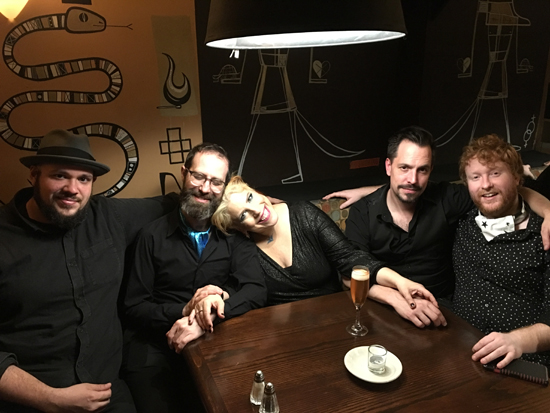
CION: And I feel like, a huge amount of credit goes to my musicians — and I feel silly and honored and a bit audacious calling them “my” musicians, because they’re not mine, but I’m gonna claim them if I can [laughs], because they’re freaking amazing. Each one brings so much excellence, so much presence; we’re really listening, we’re really listening to each other. And they do some really daring things, and it feels very very fresh, every single time. And we go to some very intense emotional places? But it’s such a beautiful balance of risk and safety, with them. It feels very ensemble-oriented and very cohesive. And we just also really enjoy each other’s company; it allows for the highs to be really high and the lows to be so low; it allows for that range, ’cuz they really are bringing their full selves to it.
HILOBROW: And I take it that… it seems obvious to me that you leave it as open in the rehearsal process, as, say, a Bowie session would be in terms of what personality each player brings to it? It seems like you even leave that opening to the unexpected onstage, as well as in the way you collectively prepare the interpretations?
CION: I feel like I want to honor his music, and more so, I wanna honor what I believe to be the intention within each song. We do kind of a mix between my intention and what I assume to be his intentions for certain things, in order to work within the larger narrative.
HILOBROW: Well, that was meant to happen just with somebody listening to the records in their bedroom, [intent and impression] are the two components.

CION: This is why that Gaga tribute at the Grammys was such a fiasco. Though he did have hits, he did hit No. 1, he did have hooks, he was not that kind of writer, overall. And the songs that really get me are the songs that really unfold and really have layers and layers and layers.
HILOBROW: I think the hits had layers too, it’s just that that Gaga performance chose to traffic only in the surface…
CION: Right, he had style, we all know that, but his style is so enduring because it was substantive.

HILOBROW: Speaking of garish theatricality, we know that Bowie had always wanted to do a musical, and as I was watching your show last time, I was reflecting on how relatively rare it is for people to cover… there aren’t a lot of well-known Bowie covers. As I was watching your show I was thinking, it seems to me that maybe it’s so hard and so relatively uncommon for people to tackle his songs because they were meant to be in a context, and to do a show of him is more successful and more fruitful than doing a song of his.
CION: It’s possible. I’m gonna have to think on that. That’s really interesting. Also interesting because he, not always but often, he put in his covers… on almost every album. The Next Day doesn’t have covers — but there are so many references to his other stuff.
HILOBROW: I don’t see it as being as referential as a lot of people do, though it feels like he was revisiting many periods of his life that he hadn’t addressed in his music at the time. Most obviously in something like “Feel So Lonely You Could Die” —
CION: My god I love that song —
HILOBROW: — and each time I hear that song I think, the sound (not the lyrics) of this song is autobiographical of someone who came of age in the 1950s, though we don’t tend to associate him with that period. Like Ziggy Stardust finally paying tribute and doing his version of “Heartbreak Hotel.”
CION: And the “Five Years” drums [at the end]…
HILOBROW: Yeah, he himself would go back into the music, [it] doesn’t [take] someone covering him to be reassessing that canon.
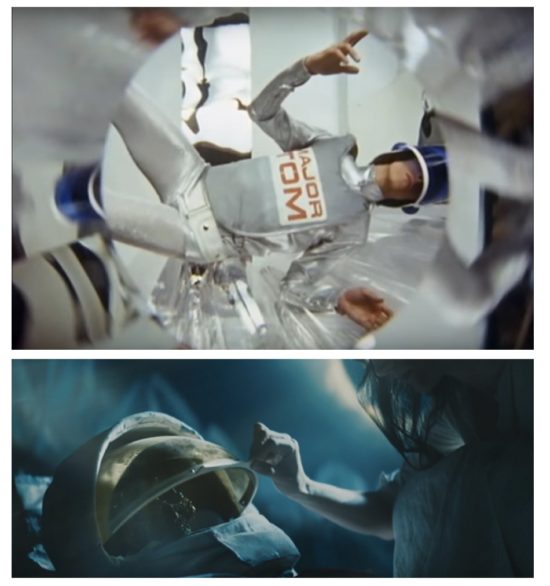
CION: He did do this; he wasn’t [sentimental], but he was — I don’t know if it’s just a work-ethic thing, or things that just kind of stuck with him, but there are these kind of overarching narratives that he never stopped exploring, or things that he kept revisiting. So, even though he was very quick to move on and try something else, there was always this context or this trying to figure out this one thing. And you see it over time. Of course, we all have our stuff, and we’re all working through it.
Cion turns 50 for one night only on July 19, when New York club Pangea becomes an arena on the inside for a special show meta-restaging Bowie’s own landmark midcentury gig; check the Pangea or Me & Mr. Jones sites for when they carry the news.
Images, top to bottom: A queen, such a queen, at New York’s Pangea (first pic, Kevin W. Condon; next three, Roque Nonini); on everybody’s wall in Philadelphia (pic by Raquel) and taking care of the room at Philly Loves Bowie Week 2019 (Elizabeth Tulin Gross); a scene from Lazarus, and Bowie at rehearsals with Ivo van Hove; Raquel (center) jammin’ good with (l-r) drummer Michael Ryan Morales, bass-player Daniel Shuman, guitarist Jeremy Bass (sometimes it just works out that way), and keyboardist/musical director Karl Saint Lucy (photo: Fred Howard); Lady so-not-Stardust at the Grammys; Rockabilly-bot Bowie from a 1983 photo-shoot; and the rise and fall of Major Tom (top, from the Love You Till Tuesday film, 1969, and bottom, from the Blackstar video, 2015)
Raquel’s costumes: David Quinn
MORE POSTS by ADAM McGOVERN: OFF-TOPIC (2019–2025 monthly) | textshow (2018 quarterly) | PANEL ZERO (comics-related Q&As, 2018 monthly) | THIS: (2016–2017 weekly) | PEOPLE YOU MEET IN HELL, a 5-part series about characters in McGovern’s and Paolo Leandri’s comic Nightworld | Two IDORU JONES comics by McGovern and Paolo Leandri | BOWIEOLOGY: Celebrating 50 years of Bowie | ODD ABSURDUM: How Felix invented the 21st century self | CROM YOUR ENTHUSIASM: C.L. Moore’s JIREL OF JOIRY stories | KERN YOUR ENTHUSIASM: Data 70 | HERC YOUR ENTHUSIASM: “Freedom” | KIRK YOUR ENTHUSIASM: Captain Camelot | KIRB YOUR ENTHUSIASM: Full Fathom Five | A 5-part series on Jack Kirby’s Fourth World mythos | Reviews of Annie Nocenti’s comics Katana, Catwoman, Klarion, and Green Arrow | The curated series FANCHILD | To see all of Adam’s posts, including HiLo Hero items on Lilli Carré, Judy Garland, Wally Wood, and others: CLICK HERE
